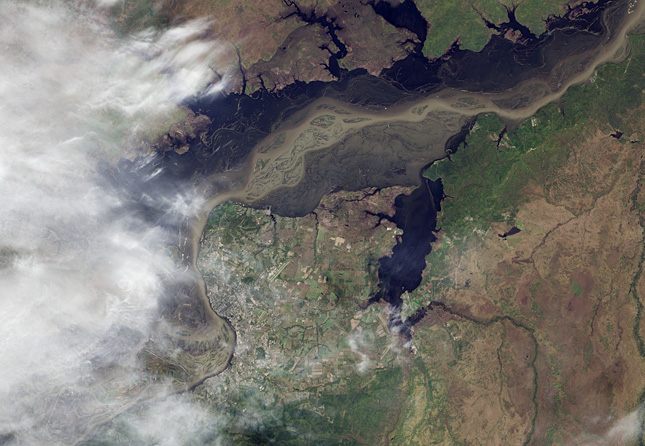-
Adaptation, Resistance, or Subversion: How Will Water Politics Be Affected by Climate Change?

One of the primary ways climate change is expected to affect international relations is through water. There are more than 270 bodies of water that cross over international boundaries, and various methodologies have identified several dozen that are particularly at risk for tension or conflict. So how is climate change affecting transboundary water politics? Are governments and institutions taking the threat seriously? A few years back, a group of researchers decided to focus on this question.
We found that understanding the power relations within basins is imperative. We put the physical science to the side (i.e., trying to determine the exact outcomes in a given river basin) and analyzed how various actors within transboundary water management are responding to climate change as they perceive it. A key conclusion is that questions about who gets what water, where, why, and how is going to depend heavily on the political context. Any physical change is going to be interpreted in light various actors’ interests (states, transboundary water management organizations). This may not seem revelatory to the political science-minded, but it bears emphasizing in the water world.
Many agreements are not suited to deal with changes in water flowWe also found that many transboundary water agreements are not suited to deal with changes in water flow, which we can expect to see as the climate changes. Agreements, where they exist, are most often based on multi-year averages of water flows and thus lack the flexibility needed to adjust to changes in availability. In addition, many lack participation from all the states sharing a given resource. Some key examples in this respect are the Nile, where sharing is currently governed by various agreements; the Jordan, where only bilateral agreements exist in spite of there being five riparians states; and the Mekong, where arguably the most important riparian, China, is only taking part as an observer in the Mekong River Commission.
The result of this research is now available in a new book, Transboundary Water Management and the Climate Change Debate, covering examples from Africa, Asia, and the Middle East from which conclusions and policy recommendations are developed.
The Threat of Securitization
In an effort to approach the issue systematically, we devised a framework to guide our analysis. It is clear that institutions, governments, and other transboundary water actors are responding to the climate change in three distinct ways: adapting to predicted impacts; resisting, as in avoiding or ignoring the issue; or subverting, as in using the debate to fulfil their own agenda.
Generally, actors understand (or choose to understand) the issue against the background of their own interests and intentions. Therefore, scientific arguments about climate change and what to do about it will be viewed in a different light depending on whether you are upstream or downstream, represent a powerful entity or a less powerful one, and so forth.
Impacts are deemed to be of such a magnitude that responses are crafted in the context of national securityIn all of the cases analyzed for the book there is evidence of responses to the climate change debate becoming securitized, whereby impacts are deemed to be of such a magnitude that responses should be crafted in the context of national security. This is important because it creates an incentive to close off deliberation to outsiders and makes it less likely decisions will be made in an open, transparent way with multiple stakeholders represented.
Such a mindset can cause changes in the quantity or the quality of freshwater available (or even the mere expectation of such changes) to provoke tension between actors both at the international as well as the sub-national levels. Besides the risk of actual conflict, the existence of underlying tensions between those sharing a watercourse poses a major impediment to socio-economic development, regional integration, and conservation efforts.
Strengthen Diplomatic Pathways or Build Anew
Ultimately, renewed political commitment to open institutional structures will be needed to mitigate these risks and blunt the potential for politics to push us towards zero-sum thinking. In many basins, these institutional structures already exist, merely needing more commitment, in others they will need to be built from scratch.
Cooperation is what we make of it. We need to find ways to bring the fears, hopes, and aspirations which basin actors may harbor about climate change into open discussion within joint institutions. By doing so, these frameworks become more legitimate – making securitization less likely – and more resilient, as they become better at dealing with changing conditions and demands from various parties.
The degree of uncertainty inherent in climate change (at whatever scale) means that joint decision-making will need to proceed with mutual recognition and acceptance by all actors of the risks involved. The implications of avoiding or delaying difficult decisions will ultimately hold even greater risk for all.
Anders Jägerskog is counsellor for regional water issues in the Middle East and North Africa for the Embassy of Sweden in Amman, Jordan. The views expressed by Jägerskog do not necessarily reflect the views of the Swedish International Development Co-operation Agency or the Swedish Government. Anton Earle is director of the Stockholm International Water Institute Africa Regional Center based in Pretoria, South Africa. Ashok Swain is a professor at the Department of Peace and Conflict Research and Department of Earth Sciences of Uppsala University, Sweden.
Sources: Earle et al. (2015).
Photo Credit: The Amur or Heilong Jiang River, which forms part of the border between China and Russia, courtesy of the NASA Earth Observatory.
Topics: adaptation, Asia, China, climate change, conservation, consumption, cooperation, development, Egypt, environment, environmental peacemaking, environmental security, featured, foreign policy, Guest Contributor, international environmental governance, Israel, Jordan, Middle East, natural resources, Palestinian Territories, risk and resilience, security, water
 A Publication of the Stimson Center.
A Publication of the Stimson Center.



